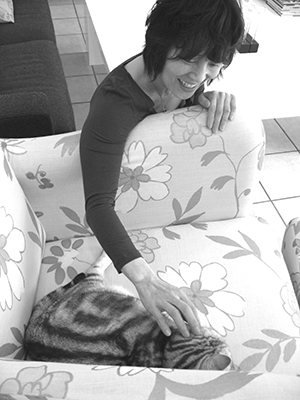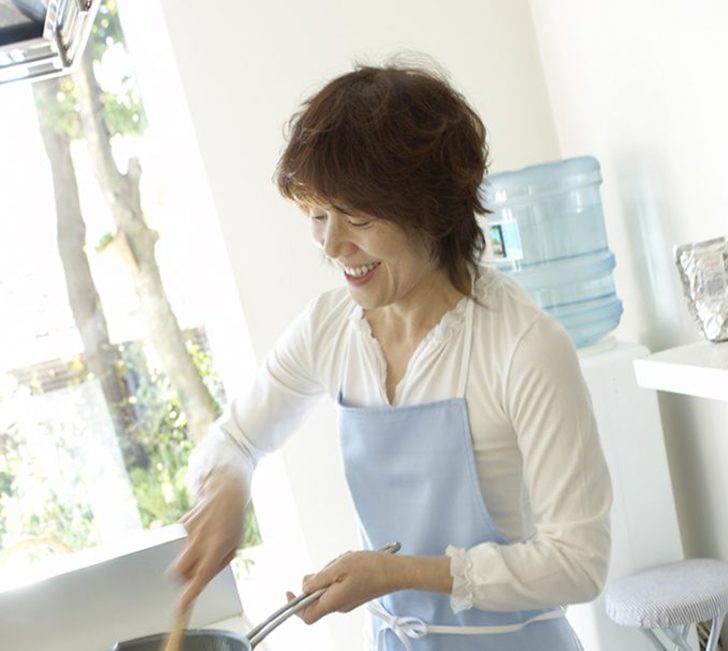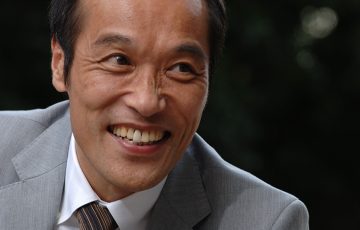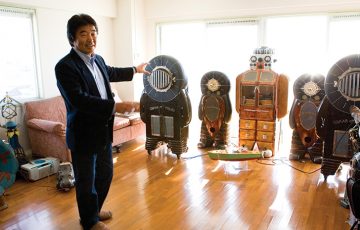 Comparisons between Harumi Kurihara -Japan’s premier celebrity homemaker -and a certain famous American counterpart (referred to hereafter as simply “M’) are almost inevitable, so let’s get the subject out of the way from the outset. Admittedly, there are similarities between the two -both have found tremendous success as lifestyle trendsetters, publishing books and magazines, and appearing on TV -but while M is known for being a stolid entrepreneur perched at the top of a corporate kingdom, it’s quite obvious that Kurihara is still focused on her family and the warmth of her home.
Comparisons between Harumi Kurihara -Japan’s premier celebrity homemaker -and a certain famous American counterpart (referred to hereafter as simply “M’) are almost inevitable, so let’s get the subject out of the way from the outset. Admittedly, there are similarities between the two -both have found tremendous success as lifestyle trendsetters, publishing books and magazines, and appearing on TV -but while M is known for being a stolid entrepreneur perched at the top of a corporate kingdom, it’s quite obvious that Kurihara is still focused on her family and the warmth of her home.
I was a housewife to start with, says a smiling Kurihara, looking considerably younger than her 60 years. I was never thinking to become an expert on cooking.
That’s probably why, despite her status as a culinary mogul, her base is a stylishly simple house in a quiet central Tokyo neighborhood, rather than a gleaming downtown office tower. It practically invites you to knock on the door and, inside, sunlight bounces off the white decor and creates a cheerful atmosphere as Kurihara serves up coffee and a handmade chiffon cake topped with fresh cream and sprinkled with cinnamon.
It quickly becomes clear that her taste is impeccable. But just how does a regular housewife, as she refers to herself, end up being the nation’s top food celebrity? What is her secret ingredient?
Born in 1947 in the small village of Shimoda in Shizuoka prefecture, Kurihara had a traditional upbringing and helped her mother prepare meals for the family -training that would prove invaluable later in life.
After I left to go to university in Tokyo, my brother and I were living together, she explains. I guess that’s when I started cooking seriously on my own.
Over time, she built up an impressive collection of recipes and when she married newscaster Reiji Kurihara, it seemed only natural that she put her expertise in the kitchen to use for entertaining. Her cooking would soon become renowned among her husband’s powerful media colleagues, who would clamor for invitations to their dinner parties just to sample Harumi’s specialties.
From there, it was a matter of climbing the ladder to reach the level of career independence and creative control she enjoys today.
I started as an assistant on a cooking show, and then I got offers to publish some books, she recalls. But at first, unless you are super popular, you can’t do what you want to do. You basically just decide if you will accept what is offered to you or not, and you can’t contribute to the creative side of production.
In 1992, Kurihara published her first cookbook titled Gochisosama ga Kikitakute! (Just because I want to hear you say, That was delicious!). And because she kept a tight grip on the reins, it could be argued the book represents the true beginning of her personal influence on households all over Japan.
It was the first project I could produce myself, she says, adding, The concept was simply to make a collection of recipes that my family loved. I worked on the cover design and thought of the title as well.
In a nutshell, the distinction that sets Harumi Kurihara apart from some of her contemporaries is that instead of brainstorming new recipes with business in mind, her recipes come straight out of her own home. Cooking is not just her job -it’s a part of her day-to-day life.
My food is not made solely for publication in magazines or on television, she notes. There are some cooking experts who separate food from their daily lives, creating dishes for specifically for editorial magazines, for instance.
That’s not me. I’m not the type. I cook for my family, and then I introduce the foods they liked best in books or magazines.
Husband Reiji -who now serves as president of Harumi’s company -and the couple’s two grown children seem to have palates that agree with much of Japan’s population, give or take a few.
That would explain why the homemade recipes they adore have spurred 60 reprints of Gochisosama ga Kikitakute!, not to mention total sales of more than 15 million copies when Kurihara’s numerous cookbooks are combined.
Rounding out her homemaking empire is a wildly popular quarterly magazine called Suteki Recipe (Excellent Recipe), a string of television shows, numerous corporate endorsement deals, as well as a line of cookware with a chain of dedicated stores under the brand Kurihara Harumi. She’s also working to establish a foothold in the interior design world with the idea of creating pleasant, enjoyable environments for housewives.
Even though it all sounds exhausting, her firm Despite this success and near-total command of the Japanese cooking and lifestyle market, however, far be it for Kurihara to sit back and rest on her laurels. Recently, she has begun testing the waters of the English-language market, publishing Harumi’s Japanese Cooking in 2004. If anyone doubted she would make a big splash, their uncertainty was quickly put to rest when, from a pool of thousands of cookbooks from every corner of the world, her title won top honors at the 10th Gourmand World Cookbook Awards.
Learning English has become part of her daily routine and she has tackled an English cooking broadcast on NHK as well. I have to explain the cooking process in English for the whole program, says Kurihara.
It must have seemed like a daunting task to host a show in a second language on television, but she was determined.
I just thought, “I really have to take this seriously and study’.
Of course, this expansion of Kurihara’s domain into English territory is a not-so-subtle recognition of the fact that the West is as ripe as it has ever been for an influx of the delicate and healthy flavors of Japan. She has been on a world tour of sorts, attracting a wealth of attention from the food media nearly everywhere she goes.
I believe the future of Japanese food is incredibly bright, she says, beaming with a dash of excitement and a pinch of confidence. In general, people care more about their health nowadays and they like to eat nutritiously, so I believe the world is ready to discover more Japanese cooking.
But in order for Japanese food to take root in Western homes, a demystification process is necessary. Many believe the cuisine is complicated and difficult to prepare, or they know little of what comes beyond sushi and tempura. Nevertheless, with her relaxed style, Kurihara appears to be the perfect candidate to serve as the nation’s culinary ambassador.
At Home With Harumi
Sitting in her dreamy kitchen that opens out onto an elegant garden complete with a fishpond, Kurihara reveals a bit of her formula.
I like to take it easy and keep things down to earth, sometimes even using leftovers, she admits as the younger of her two cats strolls into the room to say hello. She rubs the cat’s head and he seems well chuffed at the attention before scuttling away.
Even seasoning or spices, I use ordinary things that everybody keeps in their kitchen, that everybody uses, she continues, explaining the essence of her methods. Her philosophy and style are wholly unpretentious a sublime blend of simplicity and panache that dissolves effortlessly into daily life.
Kurihara’s cuisine is designed for people who cook to feed their family, but who seek a variety of dishes with a touch of flair.
Of course I sometimes introduce something new and different, but if I did that all the time, it would be impossible to keep up.
She also prefers to retain a sense of adventure by avoiding attachment to specific ingredients, fearing that while guaranteeing good taste, reliance on the same products will make both the cooking process and the resultant dishes boring. It’s risky, too, because times change one must have the ability to adapt if a favorite item goes off the market.
I never stick to one thing there’s no special must-have soy sauce, for example, because it’s impossible to use exactly the same thing forever.
Somewhat shockingly, she declares: I also don’t keep an archive of my recipes. I don’t keep them in my computer, back them up on DVDs or anything like that. I just don’t like the feeling of going back. I’d rather be positive and go forward.
Yet surely there must be times when Kurihara is at a loss for new food ideas. Creative people are prone to slumps and, after all, What’s for dinner? is an eternally difficult question for many of us.
No, she says, that doesn’t really happen to me, actually. I think it’s because I feel like I’m making the things I want to eat myself.
Leftovers always bring recipes to mind as well. Today, we had some extra satoimo potatoes and I just had the notion to use them to make some croquets.
Kurihara’s face lights up when she begins to share the recipe, but she never gives the impression of conceit one might expect from someone in her position. Listening to her describe that day’s idea is a lot like hearing about it from a good friend over tea. She simply loves what she does and merely talking about cooking makes her happy.
Basically, I suggest cooking with whatever you have on hand, and next time you can switch some of the ingredients to improve it.
There is, of course, something other than cooking that illuminates her face even more: her family. It is her true raison d’腎re, and regardless of her busy schedule she makes every effort to be at home to spend quality time with her family. To facilitate that, she maps out her days to make the most efficient use of time, not wasting a minute if she can avoid it.
I get up early each morning and I still do everything a housewife usually does, she says, along with practicing English and tending to any affairs related to her thriving company. Morning is my time, and evenings are my time with my family.
Her son, Shinpei, is active in the family business and her daughter, Tomo, is embarking on a promising career as well. As it happens unsurprisingly all members of the Kurihara household are excellent cooks, including her husband.
Even if you do great work, have a fantastic career and make a lot of money, none of it means anything if you don’t have a strong relationship with your family, she says.
In this beautiful house in the middle of Tokyo, surrounded by a tasteful interior designed by Kurihara herself, she leans back in her chair and has the air of a woman who is truly content.
My family is everything in my life.
As for the future? She thinks for a moment, glancing out the window at the tranquility of her garden. One would expect that most on-the-go businesswomen who have reached her level of prestige in their field would be thinking ahead toward big plans and bigger successes. But, again, Kurihara’s mind is somewhere closer to her heart.
I want for us to live happily as a family, and I want to have a good relationship with our son, our daughter and their partners.
A smile crosses her face as she ponders her dreams further, as though she were wearing all her happiness and excitement for the future on her sleeve.
I’d like to be genki when I’m 70, she says. I want to be healthy not only in my body but also in my mind. And I want to be the kind of grandma that my grandchildren can be proud of and say, “Hey, my grandma is cool!’
Again the question of Kurihara’s secret ingredient for success comes to mind, but perhaps there is no secret at all. Her audience admires her not for her wealth or celebrity, but rather for her friendly charm that makes their days brighter and her ample sound advice that helps them nourish their families.
Because she has never allowed her accomplishments to change her character or shift her priorities, women across Japan and likely all over the world are able to identify with her. From one mother to millions of others, Harumi Kurihara has become Japan’s top lifestyle trendsetter by staying true to herself and doing what she enjoys. In that, one can’t help but find a certain beauty.
Story by Jim Hand-Cukierman
From J SELECT Magazine, May 2007















Recent Comments